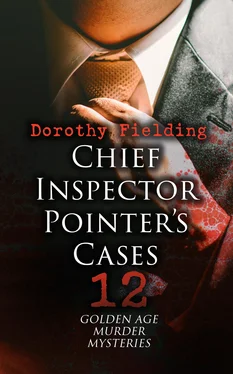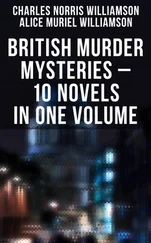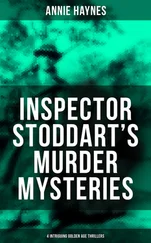"But he saw no more than I knew. I told you the man was killed by a blow from my ice-axe."
Table of Contents
POINTER had plenty to think about as he took the motor coach back to Bolzano that afternoon. So the professor was dead. He had half-feared as much these many days past, Charteris had sent off that letter to his daughter on the Monday, and had been killed the next day, while she was murdered the Thursday following, the day of its arrival in England. The Professor had not been attacked in the train before he got out at Bolzano, though the first-class coaches are usually quite empty so early in the year. It would have been an easy matter to knock him on the head and fling him out, en route. Much less troublesome and dangerous than to track him to that lonely valley.
Pointer believed that the guide's life had only been saved by his having gone on to that upper point. For the murderer came doubtless prepared with a revolver or gun to account for both, if need be.
Why was the professor's life suddenly in danger, when it seemed to have been safe up till then? Rose's murder, Pointer felt sure, was connected with the letter she had received. Could he link up her father's death with it? Not unless—unless something had happened in Bolzano which he might have been supposed to describe, or send on to her. They had pillaged his body. Were they looking for something which they expected he would have on him, and which, not finding, they assumed had been sent in the letter that he had registered to his daughter in England the day before? They must have found the receipt for the letter in his note-case.
In all likelihood, a message must have been sent to England, a telegram probably, telling her murderer to be on the lookout.
But what could have happened in the quaint little town to cause such a scheme to be necessary. Money? Inheritance? Something momentous it must have been.
Pointer did not doubt Toni's honesty. "Yes," he murmured to himself, "it looks as though something very important had happened that Monday in Bolzano before twelve, before the professor sent that registered letter, and took the postauto on to the Grödner Tal."
Pointer made his way to the Sotto Prefectura, and roamed its passages, and blundered in and out of its rooms, with as little attention paid him as though he had been a blue-bottle. At last, by mere luck, he found an elderly, pleasant-faced Italian, who looked up, and to his oft-repeated, " Il Sotto-Prefetto ?" replied, "I myself. To what do I owe the honour?"
Pointer laid his credentials down on the table and explained them. The Italian looked them over very carefully, then rose and bowed, glanced at the collar lying beside him, evidently decided that decorations need not be worn, and bowed again as he sat down.
"I am over here to try to trace a much respected compatriot, a Professor Charteris, who we know passed through this part of the world a fortnight ago. I found his murdered body to-day."
The sub-prefect, who had been listening as one listens to foreigners, intent on letting no strangely pronounced word slip past him unrecognised, his hands pressed back to back between his knees, relaxed, to throw them out in horror.
"Murdered?"
"Murdered. Now the guide who led me to the body as soon as he heard the description of the man, was Ladiner Toni."
He told Toni's story very carefully, and the corroboration of the chamois hunter.
"They are children," the sotto-prefetto said, shaking his head, "but it has an ugly sound."
"It has, signore, but there is a private matter behind all this. His daughter was murdered on Thursday in England. He on the Tuesday morning, here in Tirol."
"Alto Adige," corrected the Italian official immediately.
"That was why Scotland Yard decided to hunt out the father—as a matter of routine," continued Pointer. Whenever he insisted on doing something in his own way, he referred to it as the Yard's doing, and himself, by inference, as the straw blown hither or thither by a higher power.
"Private affair? A vendetta?"
"We don't know. It's a very mysterious story altogether. But it would suit us to keep the fact that he has been murdered quiet for a while yet. If you could seal up that rock and leave him there—and let the matter rest awhile? It has nothing to do with Toni, that I'll stake my position on. There's an inheritance mixed up in the affair, and that may be at the bottom of the two murders. This part of the world is famous for its absence of crime—"
"Smugglers thick as flies on honey," murmured the sotto-prefetto, but he was pleased at the tribute.
"I was speaking of serious crimes, and it is only fair that the good name of Tir—the Alto Adige, should not be tarnished because of a crime undoubtedly unconnected with it. Connected quite certainly with the other affair. Now, could I see the charge-sheet for Monday morning?"
The papers were laid before him. Pointer learnt that on that Monday had taken place:
(1) A bicyclist fined for riding on a footpath.
(2) A pane of glass broken.
(3) A street accident.
It was not a hopeful-sounding list for two murders.
The broken pane of glass was in a cake shop. The criminals, two little boys. Remained the street accident.
A wealthy Bulgarian gentleman, a rose-grower of Kazanlik, had been run over by a runaway cart-horse. He had died at the hospital, or just before. His papers were all in order, and his body had been at once claimed and taken on home by his friends.
Pointer rose. This was his last hope. That gone, there remained only some chance meeting, some stray letter.
The Bulgarian had been taken to Bolzano's one hospital. Thither Pointer went and made further inquiries about this Mr. Drinoff.
The sister in charge, a quaint, tubby little person, in her ugly habit, looked up the records for him. They were very ordinary. The gentleman was dead when he got there, so he had been sent at once to the mortuary chapel. Some of his friends had arrived a little, later and claimed him, and after that—she did not know exact particulars. They had taken him back to Bulgaria eventually. If Pointer wanted dates, she could only refer him to Doctor Sanftl. He would know. He had hoped to save him at first, for the man was barely dead. What hour was this? just before dinner, about eleven, or possibly half-past. The sister's dinner was at twelve, and she had had a very sketchy one in consequence.
Had a friend come with him?
Not a friend, a kindly passer-by had come in. Another Bulgarian who spoke German very well.
"Was he by any chance tall, thin, and elderly?"
" Eben ! Tall, thin, and elderly. Some sort of a professor, judging by his scholarly face."
She was quite sure he could not be English?
Put point-blank to her like that, the sister could only say that she had taken it for granted, being a foreigner, that he was also a Bulgarian, but she had no real grounds for that belief. Doctor Sanftl would know. Doctor Sanftl had talked to the gentleman a good deal.
Could Pointer see the doctor?
He was no longer at the hospital. He had left only a week ago and was now at the Mariahilf hospital in Innsbruck, but the gentleman could write.
He could, and he could also travel, and that by the next train, Pointer thought.
Doctor Sanftl had liked him immensely, that elderly foreigner, and had asked him to come again in the afternoon, he had something he wanted to show him, but the gentleman had to go on—some excursion he wanted to make, some ruins he wanted to see, if she remembered aright.
Pointer took the next train up the wild Brenner Pass and on to Innsbrück. Next morning he drove out to the hospital standing outside the town, all dreary and dirty in its summer gray.
Читать дальше












